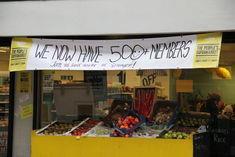
The People’s Supermarket (TPS) is to battle a court cash demand that will curtail some of its community work.
The ethical London retailer, largely run by volunteer members, has been hit with a £78,000 rates bill after an argument over its tax status.
TPS will appeal against Camden council decision not of apply business rate relief under the Discretionary Rates Review Scheme, which is frequently given to non-profit organisations.
Highbury Corner Magistrates' court yesterday ordered TPS to pay arrears of £35,000 and business rates of £45,000 for next year. TPS have agreed to pay back £600 a week part of a weekly payment plan over the next two years.
The People’s Supermarket argued that its central London store was “providing its member and the community with local food at reasonable prices” and had a “clear public benefit” to the local people and society as a whole, with all its profits being fed back into the community.
The People's Supermarket was opened last summer by Kate Bull, Arthur Potts Dawson and regeneration consultant David Barrie. TPS has 13 paid staff who are helped by nearly a 1,000 members, serving over 4,000 customers a week and was the subject of a Channel 4 documentary
Due to court order and because of the debt all planned store improvements and local community projects will have to be postponed or cancelled. These include the the instillation of air conditioning in the store, which during the summer will have a direct impact on the fresh fruit and vegetables
It will also hit attempts to get new fridges and electrical vehicles while the supermarket’s apprentice and training programmes, which currently employees four local residents who have come from the unemployment scheme, have been prematurely finished.
Co-founder Kate Bull said: “We of course will comply with the courts judgement but I feel it has highlighted some of the difficulties social enterprises face in this country. We plan to appeal against Camden council’s decision not to grant us relief under the current scheme which does allow them to give us up to an 80 per cent reduction in our business rates.
"My understanding is that because we have a declared aim to make a profit we're less eligible for support and it's counting against us to get funding."